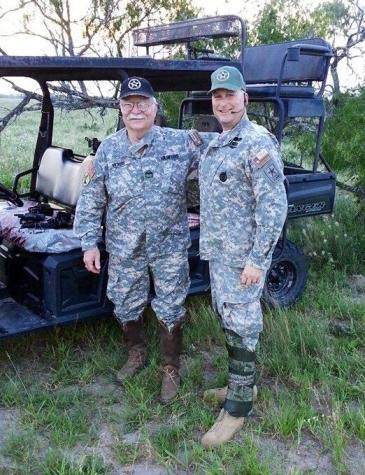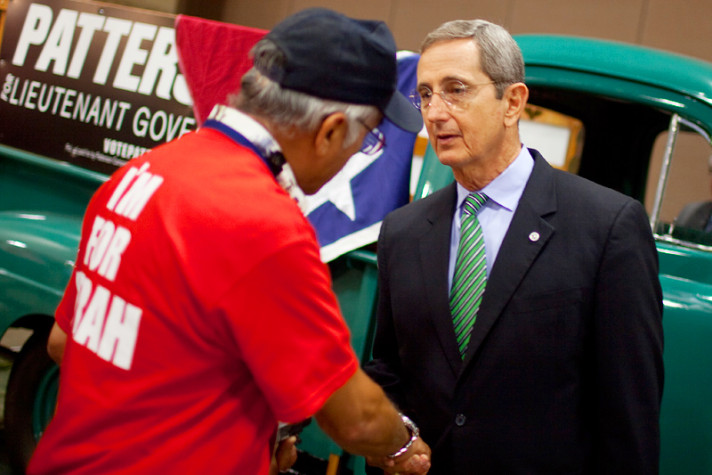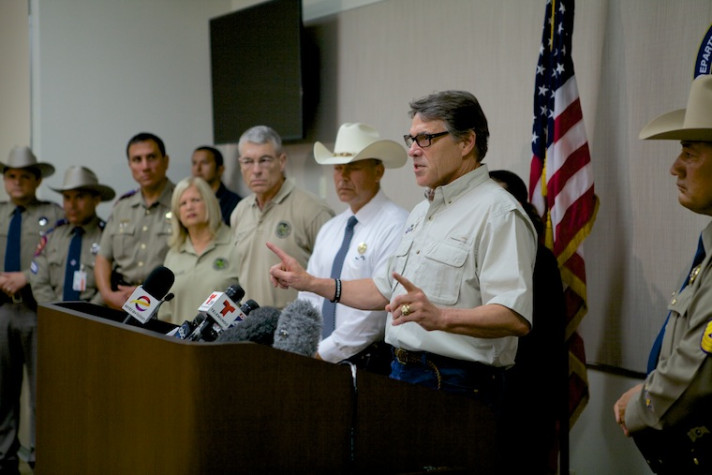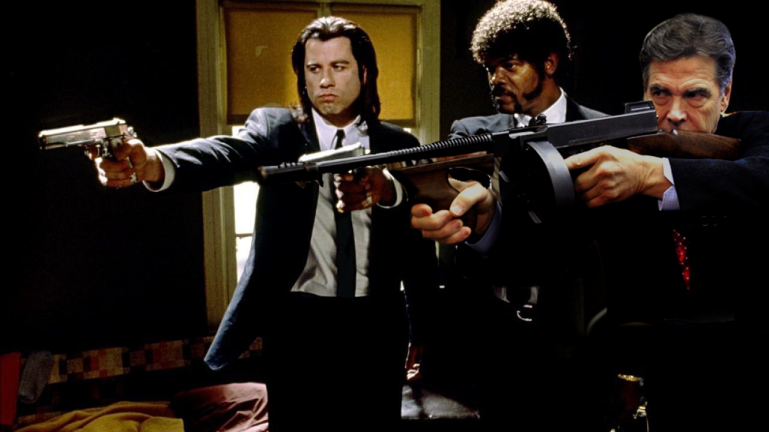
Christopher Hooks
Is that a hybrid?
Did you feel that? It’s as if there was a great disturbance in the Texas Republican Party, as if a voice said something very slightly unorthodox, hundreds screamed in terror, and the voice was suddenly silenced. I fear something terrible happened this past week—or, nothing did? It’s hard to say.
This is a play in three acts: A tale about an interview gone wrong (?) and ill-founded accusations of journalistic incompetence, framed by a true modern-day profile of political courage. It’s a story of one of the rarer feats in politics: The unforced, involuntary walkback. Take your seats, ladies and germs, and set your phones to vibrate. It’s P-time.
ACT I
If you haven’t been following the riveting race for Texas land commissioner, let’s catch up together. The Republican running is a fellow named George P. Bush, whose family you may be familiar with. He has millions of dollars at his disposal, despite the fact that he faced little opposition in the primary, and faces John Cook, a former mayor of El Paso with little funding, in November.
Despite his pedigree, Bush is new at this politics thing. His media strategy has been, essentially, don’t talk to the media. That’s understandable, because he has no strategic reason to do so until he’s more comfortable.
At the same time, he has some freedom to stake out unorthodox positions. He’s virtually guaranteed a victory in November, and he’s modeling himself as a GOP figure who stands slightly apart from the tea party—though not necessarily by his own choice. (They hate him.)
So when Bush granted the Texas Tribune’s Neena Satija an interview and seemed to speak a little off the cuff about issues relating to climate change, it wasn’t that surprising. Satija is the Trib’s environmental reporter—Bush is running for a position where, as head of the General Land Office, he’ll oversee state lands and the Texas coastline, and play a role in monitoring oil and gas leases. So climate change would have been a natural topic of conversation, and maybe Bush was testing his independence a little.
In the interview, a lightly edited transcript of which was published alongside a shorter, fairly gentle article, Bush talked about carbon dioxide emissions and the risks posed by coastal erosion, and spoke of his intention to keep talking about related issues in office. He won’t have gone far enough for some people, but he unquestionably diverged from what’s become the Republican Party’s line on this issue, which is essentially to shrug and whistle in a studiously carefree manner.
It’s either refreshing, coolly calculated, or treasonous, depending on your point of view. Here are a few excerpts, although it’s definitely worth reading the interview in full.
Satija asks Bush about the transition to a natural gas economy. Bush says emphasizing gas use will have various practical benefits. But then, unprompted, Bush raises the idea that the switch will reduce greenhouse gas emissions:
Bush: But more importantly, it’s been proven to result in less CO2 emissions, as far as our vehicles, [and] in terms of our power plants. Regardless of your politics, the EPA is regulating coal and rationing down of its overall usage in our electricity grid. In my opinion, one of the big stories of this century will be natural gas filling in that void, because it’s readily abundant.
TT: I think you may be the first Republican politician running in Texas to ever talk about reducing CO2 emissions.
Bush: [laughs]
TT: Is that something you plan to talk about more during your campaign, or as land commissioner?
Bush: Well, I do … Absolutely.
Later, Satija asks about climate change directly:
TT: So, because you talked about reducing carbon dioxide emissions, what’s your view on climate change?
Bush: Well, I think people can agree that there has been warming, you know, in recent years. The question is whether or not it’s 100 percent anthropogenic, which means man-made.
OK, that’s not the bravest stance in the world, but it’s still a little unusual for Texas. Bush goes on to talk about the importance of adjusting to coastal erosion and other climate-related issues. And when asked again, he adopts the pose of the political straight-talker. (Emphasis added.)
TT: I am really struck by some of the things you said about climate change, or CO2 emissions, and even talking about leveraging federal funds. Most Republican politicians in Texas run away from all of those subjects. Do you think those are going to help you or hurt you as you continue in your political career?
Bush: Well, you know, I’ve said to myself, to my family, to my friends from day one, that I was always going to run based on my principles.
[...]
And if you look at the facts at hand, whether it’s beach mitigation issues or dealing with future generations so that they enjoy the Gulf Coast, I think most Texans will recognize that these investments are the prudent thing to do …
So, Bush has deviated slightly from the party line, but did so in a fairly oblique way. That’s Bush’s style, it seems, or the style that’s been foisted on him: Everyone assumes that he represents something new in Texas Republicanism, but he’s run an extraordinarily cautious campaign and the leash he’s worn has been pretty short. (I wrote about him a bit earlier this year.)
ACT II
Of course, this very gentle acknowledgement that we live in a world whose climate is changing—remember, Bush never said the warming was manmade—was, for some, an extraordinary apostasy.
“Um, climate change??? Did he let on to his obsession with that lie on the campaign trail?” asks Julie McCarty, with the Northeast Tarrant Tea Party, who was one of a number of conservative grassroots that tried to beat Bush in the primary. “According to the article he lies awake at night weeping over climate change!”
In the comments section of McCarty’s Facebook page, Texas tea partiers pile on. “I will vote for a Libertarian or a Democrat before I help give this guy a platform to do more damage,” writes Jamie Jordan. Others moot the possibility of organizing a write-in campaign. (It’s too late.) “To believe in ‘global warming or climate change’ you are either a democrat or a moron,” writes Gregory Parker. “I suspect he may be both!”
Bush owes nothing to these people, and he’s earned some plaudits from certain corners for his Real Talk. It will not affect his electability one iota. By the time he’s running for governor in 2022 or whenever, not a single soul will care about this episode. So of course he’ll stand by it, right?
ACT III
On Wednesday, Breitbart Texas released a story with a blustering title: REPORTER MISREPRESENTED GEORGE P. BUSH CLIMATE CHANGE INTERVIEW. Turns out Bush doesn’t even have to undo this—Breitbart will undo it for him.
Let’s break this apart. The Breitbart article accuses Satija of both incompetence and malice, which are, of course, really serious accusations! Firable ones, even! So I’m sure the evidence here is good. Here’s the contention: “In the article, Bush was portrayed as taking a more moderate position on climate change than the standard Republican position,” writes Sarah Rumpf, a Breitbart contributor. “Bush’s comments and positions have been seriously misrepresented.”
Did Bush take a more moderate position on climate change than the “standard Republican position” in Texas? He clearly did—compare Bush’s statements in the interview with other GOP notables, like Dan Patrick, who was once asked about climate change and responded: “Leave it in the hands of God—he’s handled our climate pretty well so far.”
Here’s the weird part: Rumpf’s primary evidence is the transcript of the interview that the Texas Tribune posted and touted on its website. So the idea, I suppose, is that the Tribune, including Satija, knew it was falsely propagandizing and then published and promoted the evidence in the hopes that people would read it.
It’s a thin hit piece that performs amazing acrobatics to leave the reader with the impression that Bush didn’t say anything about climate change—didn’t go any further than Greg Abbott might go. In the interview transcript, there’s a section where Bush acknowledges that the earth is warming, then immediately pivots to a discussion about coastal erosion. Breitbart suggests, amazingly, that the two topics have nothing to do with each other:
For starters, Bush never attributes sea-level rise or coastal erosion to climate change. He remarks that Texas is facing challenges with coastal erosion in several areas, and discusses ways to help fight it, but does not state a cause for the erosion. Similarly, with the issue of sea-level rise, Satija asks Bush if he would support Texas conducting “a comprehensive study on the effects of sea-level rise on the Gulf Coast,” but again, a causal relationship to climate change is completely absent from Bush’s remarks.”
What are the causes of coastal erosion? The General Land Office’s own information—the office currently run by Jerry Patterson, mind you—tells us one major cause is that “sea level is rising in relation to the land surface along the Gulf Coast. Small increases in sea level can have profound storm surge impacts in low-lying coastal areas of Texas.” The rise in sea level, the GLO tells us, is part of a global trend.
There are other factors in coastal erosion—subsidence of land, lack of sediment to nourish beaches, storms—but sea-level rise driven by a warming planet (water expands when heated; ice sheets melt) is the coast’s biggest challenge now and in the future. Bush seems to recognize this.
Perhaps Bush was only referring to other erosion factors. But he was answering a question about climate change, and raised the issue of coastal erosion. It takes a willfully thick parsing of this language to create the false impression Bush is not speaking about climate change.
The Breitbart article objects to a number of other small perceived discrepancies between the transcript and the shorter article. Here’s one: The story suggests that Bush is OK with a move away from coal and toward natural gas and renewables for reasons that include environmental concerns, and Breitbart says that’s a lie. But in the transcript Bush explicitly argues that increased use of natural gas has “been proven to result in less CO2 emissions.”
Breitbart writers wrongly claim that the Tribune article reports that Bush is kept awake at night “by climate change,” when he meant to say that he was kept awake by the threat posed by storms. “Not OK,” writes Breitbart‘s editor.
But here’s the passage from the Trib‘s article:
The 38-year-old energy consultant added that the vulnerability of Texas’ Gulf Coast to storms, which he said is worsened by climate change-related problems like sea-level rise and coastal erosion, is something that “honestly keeps me up at night.”
What’s keeping Bush up at night? It’s “the vulnerability of Texas’ Gulf Coast to storms.”
The short of it is, one reporter accused another reporter of gross negligence (taking quotes out of context) by taking quotes out of context, and not reading particularly closely. But Breitbart’s gonna Breitbart—the sadder thing is the Bush team’s fury with the idea their candidate touched on climate issues, when … he did! Here’s Bush adviser Trey Newton: “This reporter obviously had an agenda. She came in with an agenda and completely misrepresented what he [Bush] said.”
Let’s all cherish this precious week when a rejuvenating wind of spontaneity briefly entered the P. Bush campaign: It could be quite a while before it comes back.












